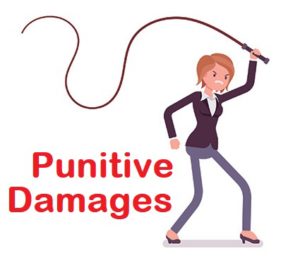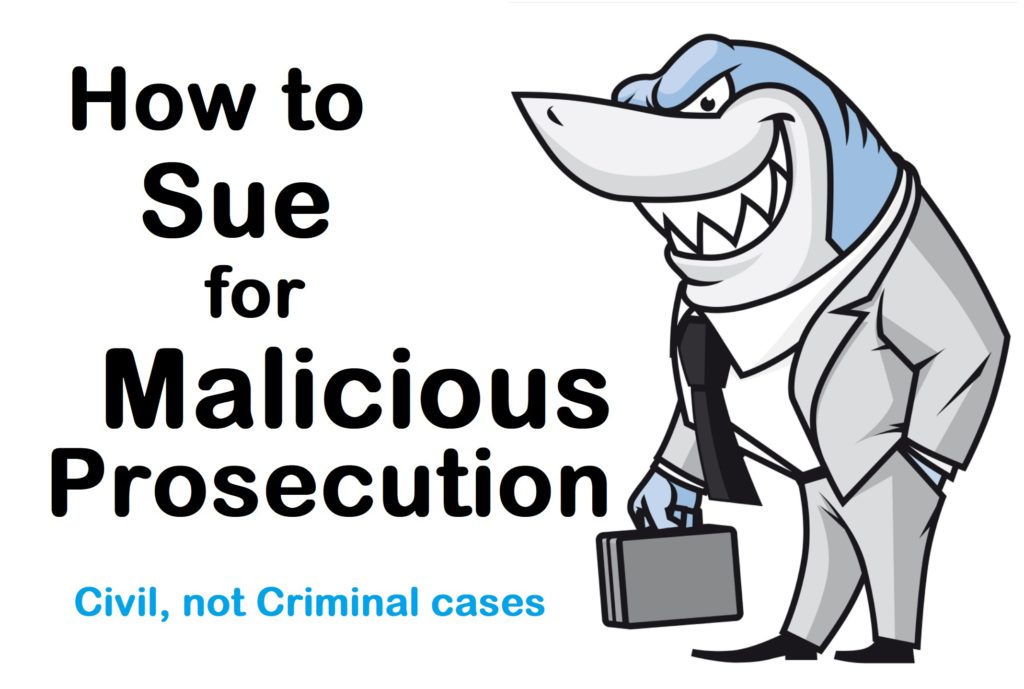Malicious Prosecution Actions Arising Out Of Family Law Proceedings: Proceed Carefully
As a general rule, California malicious prosecution actions are dicey propositions insofar as they always subject the plaintiff to a potential Anti-SLAPP motion from the defendant pursuant to California Code of Civil Procedure section 425.16. At a minimum, such a motion requires the plaintiff to immediately produce admissible evidence establishing the malicious prosecution claim. The failure to produce such evidence causes the dismissal of the case and may result in the plaintiff having to pay the defendant’s reasonable attorney fees for bringing the motion. Malicious prosecution cases arising out of family law court matters are even more problematic.
As a general rule, for public policy reasons plaintiffs are not entitled to bring malicious prosecution actions stemming from matters originating in the family law courts. Bidna v. Rosen (1993) 19 Cal.App.4th 27. A very narrow exception to the Bidna rule was carved out by Nicholson v. Fazeli (2003) 113 Cal.App.4th 1091, wherein a wife was permitted to maintain a malicious prosecution complaint against a Trust (which had previously filed a cross-complaint in the wife marital dissolution action) because the Trust’s cross-complaint did not implicate any family law issues (i.e., it did not specifically involve allegations related to marital status, child custody, spousal support, or the division of community property). Because the Trust’s cross-complaint was a fairly rare animal (the vast majority of all family law court pleadings will involve some family law issue), parties contemplating filing a malicious prosecution action arising out of a family law court are strongly advised to consult with an attorney to obtain advice before filing a complaint that might be immediately dismissed and, even worse, might subject the party to paying the other side’s attorney fees. source
Disclaimer
Proving the “Prior Action” Requirement of a Malicious Prosecution Case
When a party prevails in a legal proceeding, he or she sometimes will seek further vindication by way of a malicious prosecution action. However, no matter how frivolous the prior action was, not all legal proceedings are recognized by California courts as triggering malicious prosecution liability. In California, the filing of a frivolous garden variety civil action for breach of contract or a tort can support a later claim for malicious prosecution. In addition, the following types of legal proceedings are recognized as “prior actions” which will support a later claim for malicious prosecution:
- A special insanity proceeding (Sutherland v. Palme (1949) 93 Cal.App.2d 307, 312-13);
- A cross-complaint (Bertero v. National General Corp. (1974) 13 Cal.3d 43, 52);
- A will contest in connection with probate proceedings (MacDonald v. Joslyn (1969) 275 Cal.App.2d 282, 289);
- Administrative board or agency proceedings. (Hardy v. Vial (1957) 48 Cal.2d 577, 580–581; Nicholson v. Lucas (1994) 21 Cal.App.4th 1657, 1664);
- Judicial arbitration (Stanley v. Superior Court (1982) 130 Cal.App.3d 460, 465); and
- Petition for administrative mandate (Sierra Club v. Superior Court (1985) 168 Cal.App.3d 1138)
However, California courts have drawn the line and failed to allow liability for malicious prosecution for the institution of the following legal proceedings:
- Small claims court proceedings (Pace v. Hillcrest Motor Co. (1980) 101 Cal.App.3d 476, 479);
- Subsidiary procedural actions within a lawsuit, such as filing an application for a restraining order or for lien. (Lossing v. Superior Court (1989) 207 Cal.App.3d 635, 639; Adams v. Superior Court (1992) 2 Cal.App.4th 521, 528);
- Requests for admissions (Twyford v. Twyford (1976) 63 Cal.App.3d 916, 922);
- Motion for writ of sale. (Merlet v. Rizzo (1998) 64 Cal.App.4th 53, 63);
- A defendant’s filing of a notice of appeal. (Coleman v. Gulf Ins. Group (1986) 41 Cal.3d 782, 794);
- Family law motions or OSC’s. (Bidna v. Rosen (1993) 19 Cal.App.4th 27, 37);
- Contractual arbitrations. (Brennan v. Tremco Inc. (2001) 25 Cal.4th 310, 314);
- A departmental investigation of a police officer where no formal proceedings occurred. (Imig v. Ferrer (1977) 70 Cal.App.3d 48, 59);
- A California State Bar investigation that terminates at the investigatory stage without leading to proceedings before body that had power to action adversely affecting legally protected interests. (Lebbos v. State Bar (1985) 165 Cal.App.3d 656, 671); and
- An attorney’s complaint to state bar association where complaint does not result in initiation of any proceedings. (Chen v. Fleming (1983) 147 Cal.App.3d 36, 41)
This post is the sixth in an ongoing series of posts on the tort of malicious prosecution. Jeffrey Lewis represented the prevailing parties in the malicious prosecution case of Videotape Plus, Inc. v. Lyons (2001) 89 Cal.App.4th 156. Jeffrey Lewis and the other attorneys at Broedlow Lewis LLP are experienced litigators and can advise you about your potential rights and defenses in a malicious prosecution action. Each case is different and you should consult a lawyer rather than relying on this post as legal advice for your situation. source
How To Sue For Malicious Prosecution For A Civil (Not Criminal) Lawsuit.
You get sued. They claim to be the “victim,” but you are the real victim. You are being sued based on a falsehood … for their improper motives. Can you strike back for justice?
Victims often ask lawyers whether they can sue for malicious prosecution. Situations arise when a victim has been sued wrongfully. They have stress. They have legal expenses. Other costs come in. The wrongful lawsuit damages their reputation. It may even be damage their credit rating.
Some victims merely want emotional support. They want someone to tell them they are right, the person that sued them is wrong, and provide sympathy. That is certainly the expected role of family, and friends. It is a whole other matter entirely to counter – sue the person and attempt to win money from them.
The Benefits of Malicious Prosecution Suits
Malicious prosecution lawsuits have three main benefits:
- Compensation for out of pocket and other expenses.
- Deter or prevent the wrongdoer from wrongfully suing others in the future.
- Deter other similar wrongdoers from creating victims.
The same legal analysis must be completed regardless of whether you are a victim or an attorney. This article explains the process in a civil setting. Look to our companion article on criminal cases.
The Technical Legal Test to Win at Malicious Prosecution
The traditional elements of a lawsuit for malicious prosecution are as follows:
- The commencement or prosecution of a proceeding against the victim;
- “Legal Causation” by the present defendant;
- The lawsuit’s termination in favor of the present plaintiff;
- The absence of probable cause for the proceeding;
- The presence of malice;
- Damage to the victim.
State ex rel. O’Basuyi v. Vincent, 434 S.W.3d 517, 519 (Mo. banc 2014);
Bonzo v. Kroger Grocery and Baking Co., 125 S.W.2d 75 (Mo. 1939);
Higgins v. Knickmeyer-Fleer Realty and Investment Co., 74 S.W.2d 805,812 (Mo. 1934).
This is the traditional law for malicious prosecution. Is it confusing you? There is an easier analysis.
The Easier to Understand Test for Malicious Prosecution
The Missouri Approved Instructions for a jury trial present a straightforward analysis for evaluating potential malicious prosecution cases. It is meant for ordinary people to understand and will be easier for you.
The test for malicious prosecution is as follows:
- First, did the wrongdoer instigate or continue a judicial proceeding (a lawsuit) against the victim (you) that the victim won?
- Second, in doing that, did the wrongdoer acted maliciously and without reasonable grounds?
- Third, was the victim damaged?
Paraphrase of M.A.I. 23.07 (2000 Rev.).
What Does “Maliciously” mean?
 You may have noticed some technical terms. They are important. The first term is “maliciously.” In a civil setting, maliciously means intentionally doing a wrongful act without just cause or excuse. It does not necessarily mean hatred, spite, or ill will. M.A.I. 16.01 (1) (1996 new); see also Sanders v. Daniel Intern Corp., 682 S.W.2d 803 (Mo. banc 1984); and Proctor v. Stevens Employment Services, Inc., 712 S.W.2d 684 (Mo. banc 1986).
You may have noticed some technical terms. They are important. The first term is “maliciously.” In a civil setting, maliciously means intentionally doing a wrongful act without just cause or excuse. It does not necessarily mean hatred, spite, or ill will. M.A.I. 16.01 (1) (1996 new); see also Sanders v. Daniel Intern Corp., 682 S.W.2d 803 (Mo. banc 1984); and Proctor v. Stevens Employment Services, Inc., 712 S.W.2d 684 (Mo. banc 1986).
What Is Reasonable Grounds?
Reasonable grounds is also needed for your analysis of whether you have a malicious prosecution case. Luckily, reasonable grounds is defined. “Reasonable grounds” means the existence of facts which would cause an ordinarily careful person to believe plaintiff (the victim) was guilty of the offense charged. See Palcher v. JC Nichols Co., 783 S.W.2d 166 (Mo. App. 1990).
Our Law Dislikes Malicious Prosecution Cases
Malicious prosecution cases are not favored in the law. Stafford v. Muster, 582 S.W.2d 670, 675 (Mo. banc 1979). Because of this, you as the victim must be prepared to provide “strict and clear proof” of each of the elements of malicious prosecution. Id.
Probable Cause Weighs In Too!
The second element of malicious prosecution requiring reasonable grounds is closely related to probable cause. You should plan on addressing the probable cause elements as part of your malicious prosecution case.
The Missouri Supreme Court has set out a definition for probable cause in civil cases. It is as follows:
- The person’s beliefs in the facts alleged,
- Based upon sufficient circumstances to reasonably induce such belief by a person of ordinary prudence in the same situation, plus
- A reasonable belief that under the facts the claim may be valid under the applicable law.
Holly v. Caulfield, 49 S.W.3d 747, 750-51 (Mo. App. 2001).
The Easy to Understand Test for Probable Cause
Basically, you need to ask yourself the following questions:
- Did the person who sued you believe the facts they were alleging?
- Would any reasonable person believe those facts?
- Did the law allow a lawsuit against you; under those facts, assuming they were true?
Can I Get Punitive Damages To Punish?
 Punitive damages are called “exemplary damages” and are not favored by the courts, much like malicious prosecution cases. To get punishment damages in a malicious prosecution case, “the proceedings must have been initiated or continued primarily for a purpose other than that of securing the proper Judication of the claim on which they are based.” Proctor v. Stevens Employment Services, Inc., 712 S.W.2d 684 (6, 7) (Mo. banc 1986). Remember that punitive damages require a separate determination by the court by “clear and convincing evidence,” which is a higher standard. Remember, who you are suing must have acted with a conscious disregard for your rights. I encourage you look to my article on punitive damages to see the specific elements of that cause of action.
Punitive damages are called “exemplary damages” and are not favored by the courts, much like malicious prosecution cases. To get punishment damages in a malicious prosecution case, “the proceedings must have been initiated or continued primarily for a purpose other than that of securing the proper Judication of the claim on which they are based.” Proctor v. Stevens Employment Services, Inc., 712 S.W.2d 684 (6, 7) (Mo. banc 1986). Remember that punitive damages require a separate determination by the court by “clear and convincing evidence,” which is a higher standard. Remember, who you are suing must have acted with a conscious disregard for your rights. I encourage you look to my article on punitive damages to see the specific elements of that cause of action.
Conclusion
Malicious prosecution cases are complex and have many legal requirements, as you can see. This is why malicious prosecution is so often an accusation and so seldom an actual lawsuit.
Usually, these lawsuits come about when it is either debt collector who does not care what the facts are and sues as many people as they can to collect money. Secondly, we see malicious prosecution lawsuits when it is an actual person who is just suing to “get at” somebody. I wish you luck in your analysis and hope any victims can receive just compensation based upon our analysis. source
Learn more about these sujects
- Malicious Prosecution
- Prosecutional Misconduct
- Vindictive Prosecution
- Retaliatory Prosecution
- Abuse of Process
Selected Issues in Malicious Prosecution Cases
Malicious Prosecution / Prosecutorial Misconduct
Vindictive Prosecution – Georgetown University
VINDICTIVE AND SELECTIVE PROSECUTION
What is Abuse of Process?
Defeating Extortion and Abuse of Process in All Their Ugly Disguises
What’s the Difference between Abuse of Process and Malicious Prosecution?
Malicious Prosecution Actions Arising Out Of Family Law Proceedings: Proceed Carefully
Frivolous, Meritless or Malicious Prosecution
SCOTUS Makes It Easier To Sue Police And Prosecutors For Malicious Prosecution
Prosecutional Misconduct – SCOTUS Rulings re: Prosecutors
National District Attorneys Association – National Prosecution Standards – NDDA
What Happens If Charges Are Dropped Before Trial?
Functions and Duties of the Prosecutor – Prosecution Conduct
Possible courses of action Prosecutorial Misconduct
Misconduct by Judges & Prosecutor – Rules of Professional Conduct
PC 1385 – Dismissal of the Action for Want of Prosecution or Otherwise
Thomp$on v. Clark – Maliciou$ Pro$ecution
Reichle v. Howards (2012) – Retaliatory Prosecution Claims Against Government Officials –1st Amendment
People v. Superior Court (Greer) 5th & 8th Amendment – Bias / Malicious Persecutor
Hartman v. Moore (2006) –Retaliatory Prosecution Claims Against Government Officials – 1st Amendment
What is a Fiduciary Duty; Breach of Fiduciary Duty
Epic SCOTUS Decisions
learn more about Anti-SLAPP:
Anti-SLAPP Law in California 1st Amendment Freedom of Press & Speech
California Supreme Court Confirms that the “anti-SLAPP” Statute Applies to Claims of Discrimination and Retaliation

